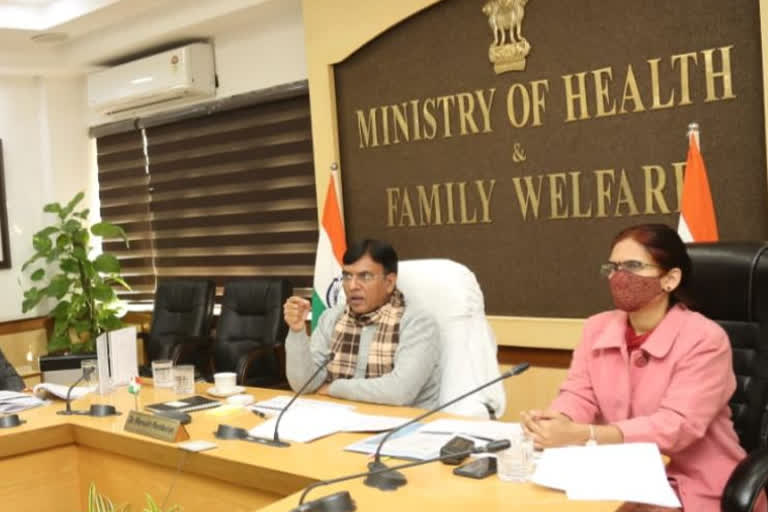New Delhi: Omicron variant is the dominant variant of SARS-CoV-2 in the country at present, Minister of State for Health Bharati Pravin Pawar informed Lok Sabha on Friday.
According to the World Health Organization, the Omicron variant has significantly increased transmissibility as compared to the Delta variant, and as a result, it is rapidly replacing the latter globally, Pawar said in reply to a written question.
"As per the available evidence, vaccines help in terms of lesser people getting infected, lesser hospitalisation and lesser severity of disease amongst the patients," she stated.
Responding to a question on whether the Omicron variant, termed the worst variant, is more pathogenic and if it can break through vaccine protection, Pawar said it is designated by WHO as a variant of concern, on the advice of the global body's Technical Advisory Group on Virus Evolution (TAG-VE).
This decision was based on evidence presented to the TAG-VE that Omicron has several mutations that may have an impact on how it behaves, for example, on how easily it spreads or the severity of illness it causes.
"While there is limited available data and no peer-reviewed evidence on vaccine efficacy or effectiveness for Omicron, Omicron variant is expected to have increased ability to evade immunity as compared to prior variants, causing re-infections in those who have had a previous infection and in those who have been vaccinated," Pawar said in her reply.
However, vaccine protection occurs through antibodies as well as through cellular immunity, which is expected to be relatively better preserved, she said.
Based on the population estimates from the Registrar General of India (RGI), 89.63 crore adult population (95.5 per cent) has received a single dose of COVID-19 vaccine as on February 2, 2022.
The Indian SARS-CoV-2 Genomics Consortium (INSACOG), jointly initiated by the Union Ministry of Health, Department of Biotechnology (DBT) with Council for Scientific and Industrial Research (CSIR) and ICMR is a consortium of laboratories to monitor genomic variations in SARS-CoV-2.
"Initially, 10 labs and now with the addition of government and private labs, the consortium has 52 laboratories. Omicron variant is the dominant variant in the country, presently," Pawar stated.
Also Read:Congress, DMK, TMC stage walkout from Rajya Sabha over NEET row
Since January 3, COVID-19 vaccination has been initiated for the age-group of 15-18 years, and a provision has also been made for administration of a precautionary third dose for healthcare workers, frontline workers and people above 60 years of age with co-morbidities since January 10.
The Co-WIN Portal has made necessary provisions to record precaution dose administered to eligible due beneficiaries, Pawar said.
On the other measures taken or being taken, Pawar said the government has been supporting states and union territories in their endeavour to manage COVID-19 since the beginning of the pandemic.
Given the emergence of mutated variants with variable impact on transmissibility, virulence and effectiveness of vaccines, the likelihood of resurgence of COVID-19 trajectory in the country is monitored by various expert committees.
The Health Ministry continues to keep a close watch over the COVID-19 situation across the country and globally as well, Pawar said.
With the reporting of the Omicron variant and its classification as a variant of concern by the WHO, the ministry revised its guidelines for international arrivals. Following a risk-based approach, provisions for mandatory pre-departure and post-arrival RT-PCR testing on day eighth of arrival and a mandatory home quarantine for seven days have been made in the present guidelines for all international travellers to India.
Besides regular review meetings at the level of the Union health minister with all relevant stakeholders, meetings with states and UTs through video conferencing have been conducted.
States and UTs have been repeatedly urged to undertake strict monitoring of international travellers in the community, do contact tracing of positive individuals and follow up for 14 days, genome sequencing of positive samples through INSACOG labs in a prompt manner, continued monitoring of areas where cluster of positive cases emerges.
Further strengthening of COVID-19 testing infrastructure and ensuring early identification of cases through adequate testing across the states and ensuring preparedness of health infrastructure and upgrading the same under ECRP-II including in rural areas and for pediatric cases, ensuring COVID-19 vaccination for the eligible population among others have been highlighted.
The Health Ministry, vide letter dated 28th June 2021, has circulated to all states and UTs guiding principles for imposition of restrictions or allowing relaxation in context of COVID-19. This has been reiterated by the Home Ministry under the Disaster Management Act, 2005 vide an order dated 29th June 2021, the minister said.
The Health Ministry continues to provide support to states and UTs to enhance preparedness and response capacities.
Funding support is also provided to states and UTs through the National Health Mission, State Disaster Response Funds and Emergency COVID-19 Response and Preparedness packages. Under ECRP phase II, a package of Rs 23,123 crores (with Rs 15,000 crore as central component) has been approved to upgrade health infrastructure.Of this, as on January 31, funds to the tune of Rs 7,245.95 crore have been released to states and UTs as part of the central component, Pawar stated in the written reply.
PTI
